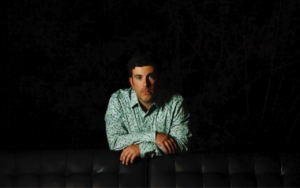Interview with Jeanine Cowen, composer, entrepreneur and owner of the film and video scoring firm, JMC Music, Inc.
Interview by Keith Hatschek originally appeared in Echoes on 10/12/10.
As owner of her own film and video scoring firm, JMC Music, Inc., Jeanine Cowen is uniquely qualified to talk about the dual track career of a composer/entrepreneur. A classically trained percussionist, she first became captivated with film scoring when a college friend asked her to write music to accompany a short film. She loved the nuance and power that music could bring to the art of filmmaking.
As your career has unfolded, what skills have been most helpful to you?
Being able to read music has been huge. I started composing when I was in high school – being able to orchestrate and arrange and think about what other musicians need and can do has been important to me, and I think it has led to me being more comfortable in the studio and being able to get out of the musicians what I need from them. The other thing that was actually key for me was my education at Berklee College of Music – forcing myself to think out of that classical box and thinking about improvisation and jazz. Having experience with a lot of different genres of music has led to me being a much more versatile film composer. You never know what you’re going to be writing. You need to be able to deliver. You need to be competent in a lot of genres.
So being a film composer or orchestrator is actually a generalist job because every filmmaker comes to you with a different set of challenges.
Yes, and you also need to know your own deficiencies, so you can go out and hire or consult with people who will be able to deliver the pieces you can’t.
And many times, as a film composer, you write something that you normally wouldn’t have written if left to your own devices. You need to be able to meld your intuition with what their needs are. You are, in the end, working for someone else.
Was it scary leaving school and saying, “I’m responsible for my next paycheck, I’ve got to find my next client…”
It was a challenge for a long time! When you’re working for yourself and you are really the master of what happens to you, you have to have a leap of faith. You have to be able to say, “I know it’s going to work out.”
One of the things I learned is that I have to have at least a month or two of living expenses in the bank, so when it comes to the end of a project, I don’t freak out and take a project I wouldn’t necessarily take otherwise. As a composer, you have to write music that comes from within you.
Having projects you connect to allows you to do that. If you’re writing for a project that you don’t truly believe in, you’re going to have a hard time being convincing.
What is a typical day like for you?
My typical day is a combination of writing music but then being an administrator of my business. You have to pay the bills, write the checks, and make the calls. And then, there’s a certain amount of troubleshooting that seems to happen every single day. If I get to spend half of my day writing music, I’m really happy about it.
So composing is a fundamental part of the business, but it isn’t the whole business.
Yeah, and I think that’s the difference. You are a musician – in a business. It’s not a hobby; you are actually running a business. And that’s the same whether you’re working for somebody else or you’re running your own business. There are certain things that have to happen because you have clients.


My first film-scoring gig was a feature film called Home Before Dark. I got it because the filmmaker had called Mason Daring and he simply didn’t have time so he recommended me. It was quite an experience. The filmmaker, Maureen Foley, and I just got along really, really well. It was a low budget film, but it has been quite successful. I still listen to the score and I don’t know how I wrote it. I wrote one of the cues in the score the night before the recording session, actually early that morning.
Your résumé also includes videogame scoring. How is that different than composing for film?
It’s different because if you’re working for a development company, it’s much more structured and they have timelines and milestones you need to meet. The collaboration aspect is very different because you are frequently working directly with the visual artists, the animators, and the development team. As much as the film industry is very team based, it’s doesn’t have as much face time as video game scoring. Composing for film can be a very solitary position. And it can be a much longer process.
Can you identify a few key skills wanting to become a composer like yourself someone should develop?
An ability to make deadlines is enormous. You can’t be the one to miss deadlines or you just won’t get hired again. You really have to have a passion for the music you are writing so you can’t let yourself get talked into writing a score for something you’re really not into. You need to be able to figure out a new [musical] angle. If the client wants something you are just not willing to deliver, you need to figure out why that is and how you can work it around into something that you can deliver. Being able to do that is essential.
Do you think that finding a mentor like you did is still the best approach to getting started as a fledgling composer once someone has the necessary musical skills?
I think it’s changed drastically since I got out of school. There are a couple of ways to go. There are definitely composers who need help; the thing is, they’re not going to advertise for a film composer to help them. They need somebody to get their system up and running, they need engineers, they need music editors. I think that those positions are really valuable for the same reason I really enjoyed working with Mason – to just get in the door and watch. I would suggest though, that if you get in that position, set a time frame so you’re only doing that for so long.
The other possibility is you can just set up shop and announce to the world: “I am a film composer.” Start going after the independent films that are happening all around the country. Go out there and do your best. One of the things about being a film composer is you must build up a clientele who come to rely on you. I’m fortunate in that over the years I’ve been able to do that so that I now have directors who do projects every few years but they always call me first.
Looking back at your career to date is there anything you wish you knew from the outset that you know today?
I think that the thing I didn’t know was I was going to be a businessperson. I assumed I would just be writing music, and didn’t really see myself taking care of all the details necessary to run a business.
Jeanine has resided in Boston for 20 years, tapping the city’s exceptional array of musical talent to perform on her soundtracks including members of the renowned Boston Symphony Orchestra. She maintains writing and production studios in Boston and LA to service her stable of film, TV, and game development clients.
Story Links
Jeanine’s Web site (includes audio samples of many of her scores and compositions)
So You Want to Be a Film Composer? – An informative article from Film Score Monthly that includes an interview with a top agent that represents some of Hollywood’s leading composers
The Complete Guide to Film Scoring – this book, written by film composer Richard Davis, looks inside the lives and work of a number of leading film composers
The Emerging Film Composer – another book that provides an overview of the people, challenges and rewards that a career in film composing offers, written by Hollywood veteran Richard Bellis
Read more: Composing for Film and Video — Echoes – Insight for Independent Artists http://blog.discmakers.com/2010/10/composing-for-film-and-video/#ixzz12GTBx14h

